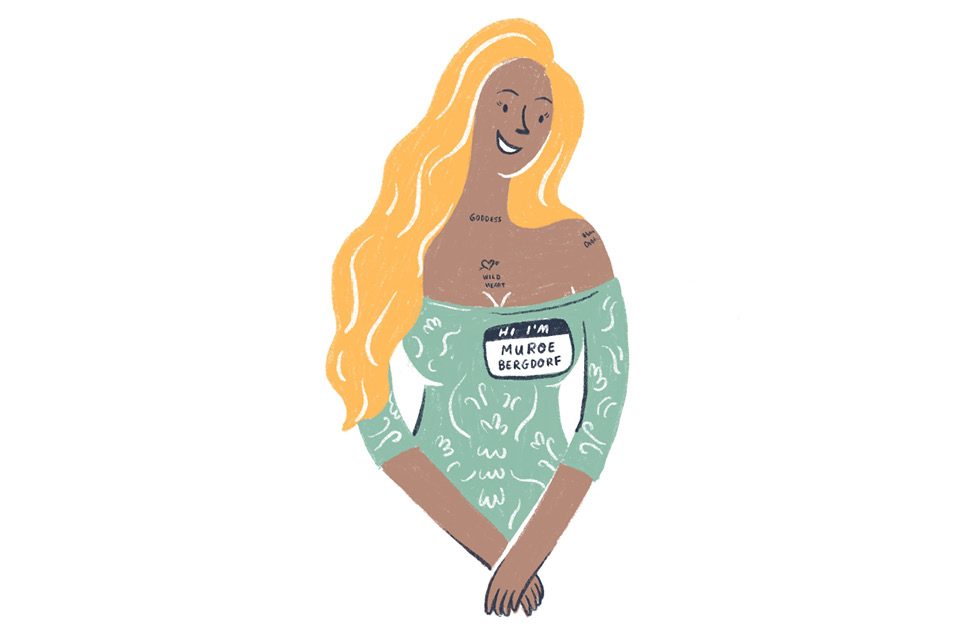Model and activist Munroe Bergdorf is a leading figure in the LGBTQ+ community, known for speaking out on trans rights and queer culture. She regularly appears on national and international television news to comment on race, diversity, gender and LGBTQ+ topics and writes for publications including Grazia, i-D and the Guardian. In 2018 she presented a documentary on Channel 4 called ‘What Makes A Woman?’ about the changing attitudes to gender. Munroe recently set up Goddess, a platform that celebrates diversity and queer culture and that will also act as a tool to help trans people raise funds to cover surgery, medical transition, housing costs and other basic needs.
“I setup Goddess as a positive space where people can learn about different people to themselves and be exposed to some positive news and positive thinking” The online community is growing with such a thirst for knowledge and a desire to discover new walks of life. Eventually I want to build it up to the point we’re doing podcasts, panel events and summits where people can come and hear from people different to themselves.
“When I first started speaking out about experiences it really wasn’t cool to do so” No one wanted to employ a loud mouth but I have always spoken up about things I don’t agree with and I wasn’t willing to compromise. Shutting up to become more successful was the worst thing I could conceive – being employed for my gender identity but not being able to speak up about it, which was what I really experienced in the beginning. Now, just a few years later, everybody is speaking up about something and that’s a really positive step forwards.
“It’s good to see yourself reflected in role models but there’s a misconception that they need to be perfect” Expecting someone to be a perfect image of a human being is a lie. My role model growing up was Naomi Campbell as she just always seemed really authentic. It’s important to see flawed, honest, imperfect people owning their growth and speaking about where they came from. That’s why Stormzy is such an important role model for young black boys: the Daily Mail comes for him but they want these kids to look up to an image of a human being that doesn’t exist instead of someone that is still growing.
“I have plenty of role models in the fashion world today” The younger generation is really changing how we think about things. The non-binary duo Art School is inspirational in how they see the no difference between menswear and womenswear. They design clothes to fit different bodies with trans people in mind, with slightly bigger shoulders for instance. I also look up to the whole Pose [the TV show set in the underground LGBTQ+ club scene in 1980s New York] family: they have set an amazing precedence for how trans people tell their stories on screen. It’s so ground breaking to have someone like Indya Moore to idolise growing up. I didn’t have that. It would have had such a big impact on how I saw myself and my place in the world. My first exposure to trans role models was Octavia St. Laurent in Paris Is Burning. I was 18.
“Diversity in fashion today changes with what city you’re in” Paris and Milan are not that great. New York is definitely leading the way with body positivity and different shapes and sizes on the catwalk. London, on the other hand, is leading the way in terms of online retail and diversity within the marketplace of fast fashion. We’re getting better and I think Instagram has played a huge part in regards to beauty standards. Big fashion houses are stealing everyday-people’s ideas that they find on Instagram. It’s opened up the world and made it a bit more accessible to larger companies.
“It’s no good for brands to talk the talk but not walk the walk” No one benefits from a Pride sandwich unless you’re donating a percentage of profits to an LGBT charity. We are living in a call-out culture where people will start to complain if brands aren’t flying the Pride flag but then people also question if brands are flying the flag why they’re not promising something back. You need to give back, you can’t just use a symbol of inclusivity as a capitalist way of increasing revenue.
“MAC is a brand that has always got it right” It has historically embraced the queer community and offered its platform. It’s been something like 20 years since it set up its Viva Glam line to benefit those living with HIV and Aids. The very first model was RuPaul. Now, 20 years later, the model is Winnie Harlow dressed as RuPaul. It shows diversity doesn’t have to be boring.
“‘Fire your CEO and hire a black woman’ is great advice” If you want to have a diverse product you need to be thinking a point of oppression: for what it feels like to not see yourself out there. It’s really important to see yourself in aspirational imagery and realise the impact that can have. If you’re looking around your company and everybody looks the same then that is a problem.
